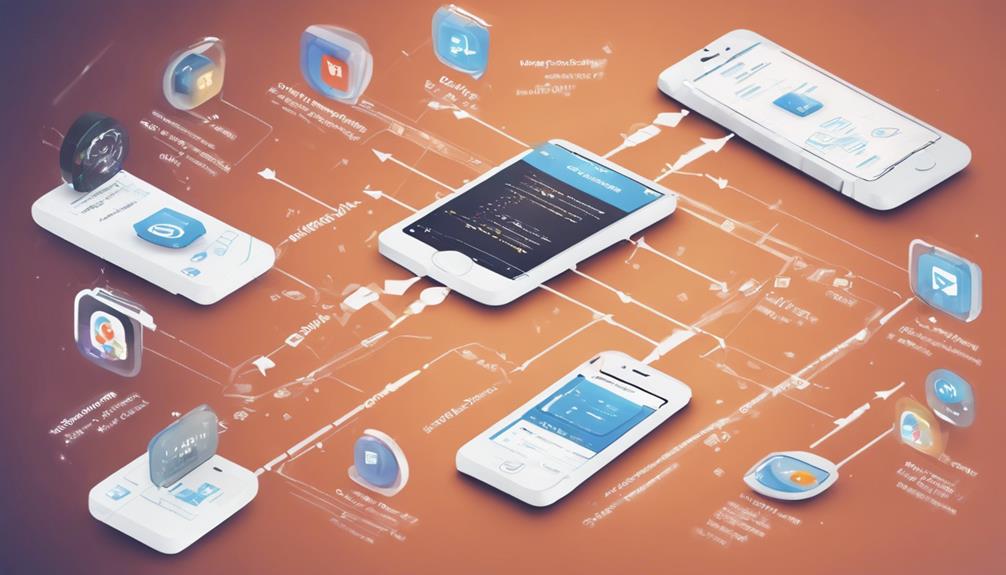Mobile Apps Development in Al Jarādīyah
Overview

Platform
When delving into mobile app development, the choice of platform plays an important role in shaping the app's reach and functionality. Android stands out as the most popular mobile app development platform globally, boasting over 2.5 billion active devices worldwide. On the other hand, iOS is renowned for its high user engagement and spending levels, with users averaging $79 per transaction on apps.Android developers typically use Android Studio, the official Integrated Development Environment (IDE) that offers a wide range of features and tools to streamline the app development process. iOS developers, on the other hand, rely on Xcode as their primary IDE, which provides a comprehensive suite of tools, simulators, and debugging capabilities for iOS app development.For those looking to target both Android and iOS with a single codebase, React Native serves as a popular cross-platform framework, enabling developers to build apps for both platforms efficiently.Front-end Tools

Security Layers
In the domain of mobile app development, the implementation of robust security layers is paramount to safeguarding user data and ensuring the integrity of the application. Security layers encompass various measures such as encryption, authentication, and authorization mechanisms that work in unison to protect sensitive user information. Multi-factor authentication (MFA) and biometric security features further bolster these layers, adding an extra level of protection.Additionally, secure communication protocols like HTTPS and SSL/TLS play a critical role in securing data transmission, preventing unauthorized access or interception.Regular security updates and patches are essential components of maintaining a secure environment, as they help in addressing vulnerabilities promptly and fortifying the existing security layers. Moreover, adhering to secure coding practices and conducting thorough security audits contribute significantly to the overall strength and resilience of the security layers within mobile applications.System Software in Al Jarādīyah

Mobile Testing
Mobile testing is an important process that guarantees the functionality, usability, and performance of mobile applications across diverse devices and platforms. To streamline this process, testing tools such as Appium, Calabash, and TestFlight are utilized to automate testing procedures for mobile apps.Various types of mobile testing are employed, including functional testing to make sure the app works as intended, usability testing to enhance user experience, performance testing to optimize speed and resource usage, and security testing to identify vulnerabilities and protect user data.Design Principles

Patents
The protection of intellectual property through patents plays a critical role in the mobile app development industry, safeguarding innovative features and technologies from unauthorized use.Mobile app patents encompass a wide range of areas, including user interface designs, algorithms, data processing methods, and software implementations. Companies invest in patent filings to shield their unique mobile app functionalities from being replicated or exploited without consent.Securing patents can confer a competitive edge, bolster market positioning, and even yield revenue through licensing agreements. Additionally, patents are instrumental in stimulating innovation, nurturing creativity, and propelling technological progress within the sector.It is imperative for developers, businesses, and investors to comprehend mobile app patents thoroughly to navigate the complex zone of intellectual property and mitigate the risks of infringement. By leveraging patents effectively, stakeholders can not only protect their creations but also foster a climate conducive to continual advancement in mobile app development.Development Process

Market Research
Effective market research plays a pivotal role in shaping successful mobile app development strategies. This process involves in-depth analysis of user demographics, preferences, and behaviors to customize apps accordingly. By understanding competitor apps and market trends, developers can pinpoint unique selling points and areas for enhancement. Additionally, researching app store guidelines and requirements is essential to guarantee compliance and optimize visibility and user engagement.Utilizing analytics tools to monitor app performance, user interactions, and retention rates is indispensable for making informed decisions regarding updates and improvements. Continuous market research is paramount for staying competitive, adapting to evolving user needs, and leveraging emerging trends in the mobile app industry. By staying attuned to the market landscape and user feedback, developers can refine their app development strategies to meet user expectations and achieve success in a dynamic and competitive app market.UX Design in Al Jarādīyah

App Building in Al Jarādīyah
Developers utilize various programming languages such as Java, Swift, C#, and HTML5 to create software tailored for smartphones and tablets in the field of app building. In this process, designing interfaces for mobile platforms is important, focusing on simplicity and efficient user experience.When building an app, developers may need to decide between native and hybrid development approaches, considering factors like platform support and target audience. Additionally, leveraging cloud services can enhance app functionality by offloading processing tasks and integrating advanced features.It's noteworthy that app building costs can vary notably based on complexity. Basic apps may start at $50,000, while more complex ones could cost $250,000 or more. By carefully selecting the programming language, development approach, and considering cost factors, developers can create high-quality apps that meet the needs of their target users effectively.
Testing Phase

Best Platforms
In the domain of mobile app development, selecting the most suitable platforms is paramount for guaranteeing efficient and effective app creation. Several platforms offer unique features catering to different development needs.BuildFire stands out for its user-friendly drag-and-drop interface, enabling app development without coding knowledge.Flutter provides a rich set of customizable widgets, facilitating the creation of visually appealing and fast apps on both Android and iOS platforms.Xamarin offers the advantage of cross-platform development with a single codebase, reducing the time and effort required for app creation.PhoneGap supports the development of hybrid mobile apps using familiar web technologies like HTML, CSS, and JavaScript.Additionally, Appery.io provides a cloud-based platform with visual development tools and backend services integration, offering a complete solution for building mobile apps efficiently.Choosing the right platform depends on the project requirements and the desired outcome, so developers must carefully evaluate these options to guarantee the success of their mobile app endeavors.Frequently Asked Questions
How Do I Start Developing Mobile Apps?
To initiate on developing mobile apps, start by learning programming languages such as Java, Swift, C#, or HTML5. Understand native vs. hybrid app development, choose the right platform (e.g., Android or iOS), prioritize user-friendly interfaces, and consider leveraging cloud services for enhanced functionality.What Does Mobile Application Development Do?
Mobile application development involves creating software tailored for mobile devices like smartphones and tablets. It aims to enhance user experiences, meet market demands, and maintain relevance in the digital space. Various programming languages and platforms support this endeavor.What Skills Are Required for Mobile App Development?
Understanding programming languages like Java, Swift, Kotlin, C#, or HTML5 is vital for mobile app development. Proficiency in mobile app design principles, UX/UI design, development frameworks such as React Native, Flutter, Xamarin, or Ionic, testing tools, and problem-solving skills are essential.How Much Does It Cost to Build a Mobile App?
Costs to build a mobile app depend on factors like complexity, design, and user experience, ranging from $50,000 to $500,000. Key considerations include backend development, platform compatibility, and ongoing maintenance. Quality design, testing, and features impact costs.Al Jarādīyah Mobile Apps Development
Al Jarādīyah is a leading company in the mobile apps development industry. With a strong focus on innovative and cutting-edge solutions, Al Jarādīyah has consistently delivered high-quality mobile apps to clients from around the world.
One of the key factors behind Al Jarādīyah’s success is their team of highly skilled and experienced developers. The company has a strict hiring process, ensuring that only the best talent is brought on board. This has allowed Al Jarādīyah to consistently produce apps that not only meet the needs of their clients but also exceed their expectations.
In addition to their talented team, Al Jarādīyah also stays up to date with the latest trends and technologies in the mobile apps industry. This ensures that the apps they develop are both functional and modern, giving their clients a competitive edge in the market.
Another factor that sets Al Jarādīyah apart is their commitment to customer satisfaction. The company works closely with their clients throughout the development process, ensuring that their vision is brought to life in the final product. This level of dedication has earned Al Jarādīyah a reputation for delivering exceptional work, time and time again.
In conclusion, Al Jarādīyah is a powerhouse in the mobile apps development industry. Their combination of top-tier talent, industry knowledge, and customer-centric approach has led to the successful creation of numerous high-quality mobile apps. For businesses looking to develop a mobile app that stands out in today’s competitive market, Al Jarādīyah is the clear choice.
